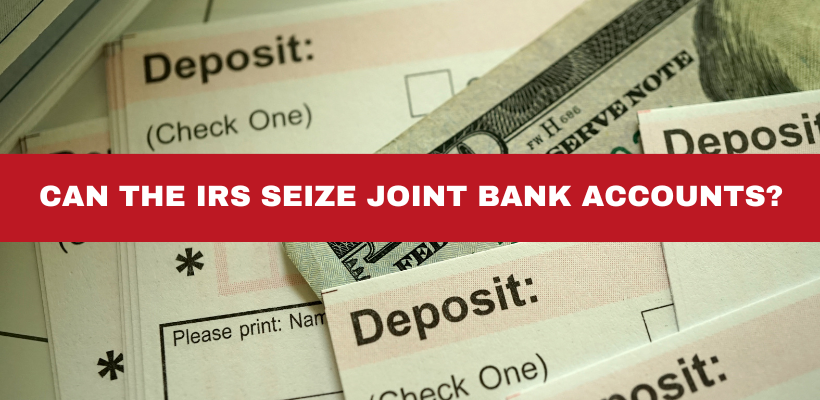If you share a bank account with someone who has IRS tax debt, you might be wondering: Can the IRS take money from a joint account, even if I don’t owe them anything? Unfortunately, the answer is yes, and if you’re not careful, your own money could be at risk.
Let’s break down what you need to know about how the IRS treats joint bank accounts, what they’re legally allowed to do, and how you can protect yourself.
Yes, the IRS Can Levy Joint Accounts
The IRS has the authority to collect unpaid taxes through a process called a levy, which means they can legally seize assets like wages, bank accounts, and even property. A joint bank account is not off-limits, even if the tax debt belongs to just one of the account holders.
Here’s the catch: even if the IRS only intends to collect what the tax debtor owes, they can initially freeze or seize the entire account balance. It’s then up to the other account holder (who isn’t responsible for the tax debt) to prove that some or all of the funds in that account legally belong to them.
How the IRS Determines Ownership
Whether or not the IRS will keep the full amount in a joint account depends on how ownership is determined, and this can vary based on state law. Some general guidelines include:
- In community property states, money in joint accounts between spouses may be treated as equally owned. That means the IRS can legally go after the entire balance.
- In non-community property states, ownership is typically based on who contributed the funds. If you can show that you deposited most or all of the money into the joint account, you may be able to get your portion back.
In short, the IRS doesn’t assume equal ownership by default. They look at contribution history and how the account is used.
You’ll Get a Warning First
Before levying any account, the IRS is required to send a Final Notice of Intent to Levy (usually Letter 1058 or LT11). This notice gives the taxpayer at least 30 days to respond, pay the debt, or request a Collection Due Process (CDP) hearing.
If no action is taken, the IRS can proceed with the levy, including freezing and withdrawing funds from a joint account.
What You Can Do to Protect Yourself
If you’re the non-liable party on a joint account that’s been hit by an IRS levy, don’t panic. You still have options:
- Contact the IRS immediately and explain your situation.
- Submit documentation (like pay stubs, deposit history, or account statements) showing that the money belongs to you.
- Request a levy release or file a claim to recover your share of the funds.
- Consider removing your name from any joint accounts where you’re at risk due to another person’s tax debt.
And if you’re the taxpayer who owes the IRS, you may want to explore alternatives before things reach this point. Options include an Installment Agreement, Offer in Compromise, or being placed in Currently Not Collectible status.
Final Thoughts
Dealing with the IRS is stressful enough without the added confusion of joint accounts. If you’re worried that your money might be seized due to someone else’s tax debt, or if the IRS has already taken action, it’s best to speak with a qualified tax professional right away.
At the Law Office of Steven N. Klitzner, we help clients in Florida and beyond handle tough IRS issues like levies, garnishments, and tax debt negotiations. If you’re unsure of your next step, reach out to us, as we’re here to help.







 Steven N. Klitzner, P.A. is a tax attorney based in Miami, Florida. He has been practicing tax law for over 40 years, and currently holds a 10.0 rating by Avvo. Mr. Klitzner was appointed to the IRS Service Advisory Council in 2021 and is...
Steven N. Klitzner, P.A. is a tax attorney based in Miami, Florida. He has been practicing tax law for over 40 years, and currently holds a 10.0 rating by Avvo. Mr. Klitzner was appointed to the IRS Service Advisory Council in 2021 and is... 





